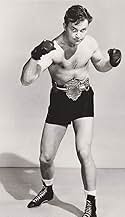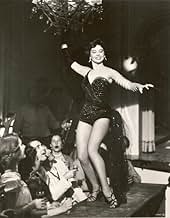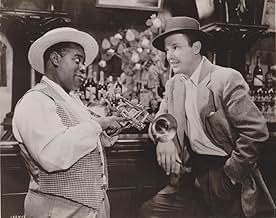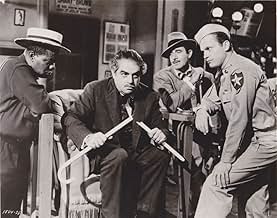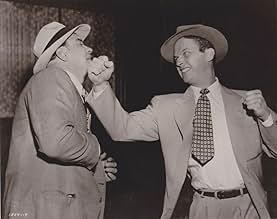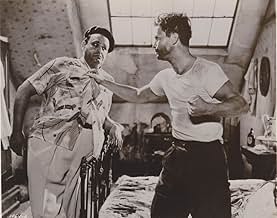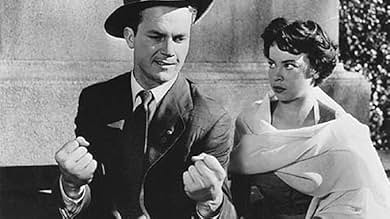Ajouter une intrigue dans votre langueAn about-to-retire New Orleans newspaper columnist tells the story of a most unforgettable character: boxer Socks Barbarossa.An about-to-retire New Orleans newspaper columnist tells the story of a most unforgettable character: boxer Socks Barbarossa.An about-to-retire New Orleans newspaper columnist tells the story of a most unforgettable character: boxer Socks Barbarossa.
- Fighter
- (non crédité)
- Waiter
- (non crédité)
Avis à la une
So the story of Socks is the plot, and oh what a tangled mess it is. First, Socks is supposed to be heading for the championship in the ring, but one night he just runs away before the fight even starts. He says he is quitting, and will not say why. This is apparently enough for his blind backer, the Judge (Kurt Kasnar), to turn from friend to enemy. Every time he sees the guy he practically hisses and spits on him Come to think of it, I think he does spit on him. Socks is in love with Angie, the Judge's daughter (Leslie Caron), and she wisely postpones their wedding because married women can't work burlesque, which is what she has been doing and Socks is not trained to do anything but fight.
So Socks hits the skids for awhile, drinking his troubles away, and then joins the army and goes to Korea where he wins the Congressional medal of honor. He comes back, feted by military brass and the political elite of New Orleans, but after awhile he is forgotten again. So he picks up where he left off before Korea, whining endlessly about how bad he has it. I think he was going for the Frank Sinatra, "I'd-have-no-luck-if-it-wasn't-bad" vibe, but Meeker just plays this like a 20-something that never grew up. He lacks Sinatra's ability to project an interesting melancholy mystique.
I'll let you see how this film meanders to its confusing conclusion. It is probably worth a look for a few reasons that have nothing to do with the main character or the plot. For one you have musical interludes featuring the musical talent of the great Louis Armstrong and the dancing of Leslie Caron who does the best she can with a part in which she is completely miscast. Also, the film does have great atmosphere. You feel like you are on the gritty rain soaked streets of New Orleans back before it became riddled with crime and was just full of characters. You can almost hear Marlon Brando tear his tee shirt while crying "Stella!" somewhere out there in the French quarter.
Thus it's a 50/50 proposition as to whether it is worth your time.
Ralph Meeker. Best remembered as Mike Hammer in Kiss Me Deadly, he caught the studio's eye when he replaced Marlon Brando on Broadway as Stanley Kowalski in A Streetcar Named Desire. On the off-chance that the N'Awlins setting might work its voodoo once more, the brawny Meeker was cast as a prizefighter called Socks Barbarossa.
Leslie Caron. Fresh from An American in Paris, she was at best a dancer with a Gallic accent and gamine charm. Here, she supports her blind father (Kurt Kaszner) by kicking (en point, no less) in hoochie-koochie numbers in a dive called Chez Bozo; it's a cross between Harriet Hoctor and Mary Tyler Moore as Laura Petrie, dancing in Capris.
Louis Armstrong. Instead of turning him into a jazz-joint headliner, he's relegated to the part of a philosophizing guide for the sightless old grump; thankfully, he sings a few songs and blows his horn now and again.
All in all, Glory Alley is a Runyonesque slice of life set among the poor people of the Big Easy. Meeker, in love with Caron but hated by her father, sustains a none-too-plausible run of ups and downs (there's even an excursion to Korea). It's a pot-luck special, made (it seems) to clear out the studio's larders.
Ralph Meeker, the brilliant star of "Kiss Me Deadly" who did way too few movies, plays a boxer named Socks Barbarosa. Maybe Bill Clinton named his cat after this character.
Meeker is also very good in "Show In The Sky." He was generally underused ion movies, though.
"Glory Alley" is a kind of faux-Damon Runyon. Runyon gone South to New Orleans. We have Socks. We have a blind man called the Judge. His helper, played by Louis Armstrong, is named Shadow.
The Judge has an Italian accent; yet his daughter has a French accent. And no wonder: She is Leslie Caron. Caron and Meeker could have been a fantastic combination. She's appealing. It's hard, though, to believe that she is doing music hall numbers at a dive called Chez Bozo and her father doesn't know it. He seems to know everything else that's going on.
The movie is narrated by newspaper reporter John McIntire. It's a voice-over narration, looking back on the vents we're seeing. But this is no noir. McIntire tells us it's the most fascinating story he ever covered -- and he's never told the truth till now -- is that of Socks Barbarosa.
Well, it could have been a fascinating story. It's peopled with fine actors and a superb leading man. But it doesn't hold together. This is not to mention its preaching: Much of the dialogue, especially toward the end, sounds as if it came from a sampler on a wall. Nor what sounds like the MGM Chorale that accompanies some of Armstrong's trumpet playing and is sort of an uplifting Greek chorus.
Le saviez-vous
- AnecdotesNone of the songs performed in the film are listed in the on-screen credits. In addition to the songs Louis Armstrong performed in the film, he recorded another song, "It's a Most Unusual Day," by Jimmy McHugh and Harold Adamson, but it was cut. That outtake, several songs from this film, plus songs from other Louis Armstrong M-G-M films, were included on a CD anthology entitled "Now You Has Jazz: Louis Armstrong at M-G-M," released in 1997 by Rhino Records.
- GaffesAt the 40 minute mark, Angie begins reading a letter from Socks. As she holds up the one-page letter, it is clear that there is no writing on the back of the letter. However, she turns the letter over and seems to be reading the back of the letter. After dancing in the living room, she picks up the letter again, and the entire front page is visible, and one can see that the entire letter is written on the front page only.
- Citations
Gabe Jordan: Politicians aren't New Orleans. For the real story you gotta go to the - real people. The people of desire on Piety Street. The people of piety on Desire Street. And the people of good intentions on Bourbon Street. My street. My favorite beat. It has more grifters, grafters, guzzlers, and guts than any other street in the world. Buccaneers Alley, Thieves Alley, and this stretch, the block I call Glory Alley. Glory Alley - a world of square guys with round edges. Where love with larceny, courage and crime, nobility and amorality, come out of the same barrel. Beer barrel or whiskey barrel, preferably bourbon. Life is fundamental to mugs, pugs, and lugs. You settle it with fists or rationalize it with dreams out of a bottle. Yet, in the bottom of life's gutter, you can find, if you look up hard enough, more beauty, dignity and sensitivity, than anywhere else in the world. Has beens, might have beens, never was it, and - champions.
- ConnexionsEdited from Modern New Orleans (1940)
- Bandes originalesGlory Alley
(uncredited)
Music by Jay Livingston
Lyrics by Mack David
Sung by chorus over opening credits and at the end
Meilleurs choix
Détails
Box-office
- Budget
- 971 000 $US (estimé)
- Durée1 heure 19 minutes
- Couleur
- Rapport de forme
- 1.37 : 1
Contribuer à cette page


